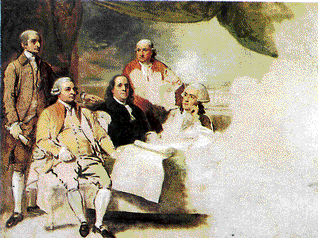

General Cornwallis surrendered at Yorktown on October 19, 1783. This would be the last major battle of the Revolutionary War. There were some small battles between the British Army and the Continental Army, but they were more skirmishes than battles. It took some time for both sides to realize that this was the end of the war. It was eight years after the "shot that could be heard around the world" was fired in Lexington on April 19, 1775.
After the battle, General Sir Henry Clinton marched with his troops to New York, General Washington returned his army to the North and the French navy returned to the West Indies.
When the news of Yorktown reached London, Lord North was really shocked. He still assumed the British Army would in the end keep control of the Colonies. He is quoted as saying: "Oh God! It is all over!" King George III wanted to continue the war, but he could not get enough financial support from the Parliament. The British Parliament never thought the war would last as long as it did and they had to raise taxes higher than ever to pay for the war. The Parliament also worried that the Colonies' relationship with France would hurt their trade with the Americas which was very profitable for the English. The Parliament would not agree with King George III to continue the war.
In March of 1782 the British Parliament said they "would consider as enemies to His Majesty and the Country all those who should advise or ... attempt the further prosecution of offensive war on the Continent of North America."
General George Washington was not convinced Yorktown would be the end of the war. He wrote "My only apprehension is lest the late important success, instead of exciting our exertions . . . should produce such a relaxation in the prosecution of the war, as will prolong the calamities of it." When he saw the British troops leaving the Colonies under General Sir Guy Carleton, who had taken over for Sir Henry Clinton as commanding officer in America, General Washington became more sure that the long war was finally over.
During the summer and fall of 1782, John Adams, Benjamin Franklin, and John Jay, who represented the Colonies, negotiated with the British delegates in Paris, France. By the end of November, the delegates from both sides had reached an agreement, but the British delegates had to now explain everything to King George III. England also had to make peace with France and Spain before the treaty would be signed.
In February of 1783, George III finally issued his "Proclamation of Cessation of Hostilities," which opened the doors for a peace treaty between England and the American Colonies.
On September 3, 1783, in Paris France the peace treaty known as the "Paris Peace Treaty" was in effect. Benjamin Franklin and John Jay signed the treaty as representatives for the United States of America and Great Britain. The Paris Peace Treaty did many things:
Great Britain lost a lot of territory through the Peace Treaty.
In November 1783 the British troops left New York City and the Continental Army was disbanded. General George Washington went home to Mount Vernon and planned to retire to work on his plantation. The Continental Congress became the Constitutional Congress and the members started drafting the Constitution of the United States of America and the Bill of Rights.
Unfortunately, this was not the end of America's fight against Great Britain. Some British troops did not leave the colonies and continued to cause problems for the Americans. Twenty-nine years later, the United States would find themselves at war with Britain again. I did a report on three different battles of the War of 1812 that explains a little about that war. Some historians say that the War of 1812 is when America really won its independence.




